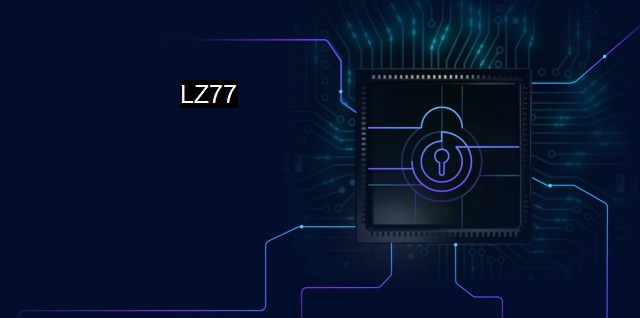What is LZ77?
The Power of the LZ77 Algorithm: Enabling Efficient and Effective Cybersecurity Compression and Detection
"LZ77" , otherwise known as the Lempel-Ziv 77 algorithm, is a powerful tool in the world of cybersecurity. It is named for its creators, Abraham Lempel and Jacob Ziv, and the year of its inception in 1977. In the digital world, LZ77 plays a critical role in multiple areas, such as mundane file compression to profound realm of cybersecurity and antivirus programming.To understand the importance of LZ77, one needs to understand the principle of data compression. Compression is the technique of reducing the size of data, making it easier to transmit over the network or store on a drive, without affecting readability. It's essentially the process of transforming input, eliminating redundancy, and reducing size for storage and transmission. File compression can be in two ways: lossy, where some of the data is lost during compression, and lossless, with completely reversible compression and no loss of data. LZ77 is an example of a lossless compression algorithm.
How LZ77 works can be quite complex in details, but simply put, this algorithm reduces redundancy by replacing repeated occurrences of data with references to a single copy. It comprises a sliding window that moves through the input data. The window is divided into 'search' and 'look-ahead' buffers. The search buffer contains recently processed symbols, while the lookahead buffer contains symbols to be processed. The algorithm moves through the data, finding repeated sequences of text and representing them as distance-length pairs or pointers backward to previous copies for the repeated occurrences. This reduces the overall size of the data, effectively compressing the files.
In cyber-security and antivirus software, LZ77 has special relevance. Often virus signatures contain recognizable strings. By applying the LZ77 compression algorithm to virus databases, cybersecurity software can reduce the storage required for holding identified virus signatures, enhancing operation speed, and making updates easier. decryption algorithms in antivirus systems utilize forms of the LZ77 algorithm to unpack compressed malicious code for analysis and identification.
The identification of malware signatures is a primary function of antivirus software. Using LZ77 for decompressing malware signatures enables the antivirus to analyze and identify possible threats much more efficiently due to reduced processing. Effectively, it increases speed and efficiency in memory usage, resulting in faster and more capable virus scanning and detection capabilities.
LZ77 also acts as a content-aware preprocessing stage for encryption. In applied cryptography, LZ77 and its variants can provide optimal compression ratios in contexts like secure email transmission, web traffic, mobile communication, and secure file storing. It enhances the performance of cryptographic protocols where reducing the size of transfer data has implications for security.
Another important application of LZ77 in cybersecurity is also seen within Intrusion Detection Systems (IDS). IDS systems scan network traffic to identify potential threats or intrusions. By using LZ77-based versions, it becomes more efficient in compressing this traffic, thus reducing the communication cost and improving network security.
Despite being developed over four decades ago, the LZ77 algorithm has proved its worth and adaptability in many ICT applications, including file compression, antivirus software, intrusion detection systems, and secure data transmission. With its wealth of practical uses and comprehensive variability, this ingenious algorithm will continue to form the backbone of cybersecurity and antivirus software for many years to come. Thus, LZ77 plays a vital role in cybersecurity infrastructure, helping protect the digital world against an ever-growing wave of new and sophisticated threats.

LZ77 FAQs
What is LZ77 and how does it relate to cybersecurity?
LZ77 is a lossless data compression algorithm that can be used in cybersecurity to compress large files, reducing the amount of disk space they take up and making them easier to transmit.How does LZ77 work?
LZ77 works by searching for repeated sequences of characters within a data stream and replacing them with shorter references to those sequences. The algorithm maintains a sliding window that moves across the data stream, keeping track of previously seen patterns and referencing them as needed.Can LZ77 be used in antivirus software?
Yes, LZ77 can be used in antivirus software to compress large virus definition databases. This not only saves disk space but also improves scanning performance by reducing the amount of data that needs to be scanned.What are some potential weaknesses of LZ77 that could be exploited in a cybersecurity context?
One potential weakness is that LZ77 relies on finding repeated patterns in data, which means that if an attacker were to deliberately insert random data into a file, it could reduce the effectiveness of the algorithm. Additionally, if an attacker is able to predict the sliding window size used by the algorithm, they could potentially use this information to insert malicious code that would go undetected.Related Topics
Data compression Data encryption Malware detection Vulnerability assessment Packet analysis
| | A | | | B | | | C | | | D | | | E | | | F | | | G | | | H | | | I | | | J | | | K | | | L | | | M | |
| | N | | | O | | | P | | | Q | | | R | | | S | | | T | | | U | | | V | | | W | | | X | | | Y | | | Z | |
| | 1 | | | 2 | | | 3 | | | 4 | | | 7 | | | 8 | | |||||||